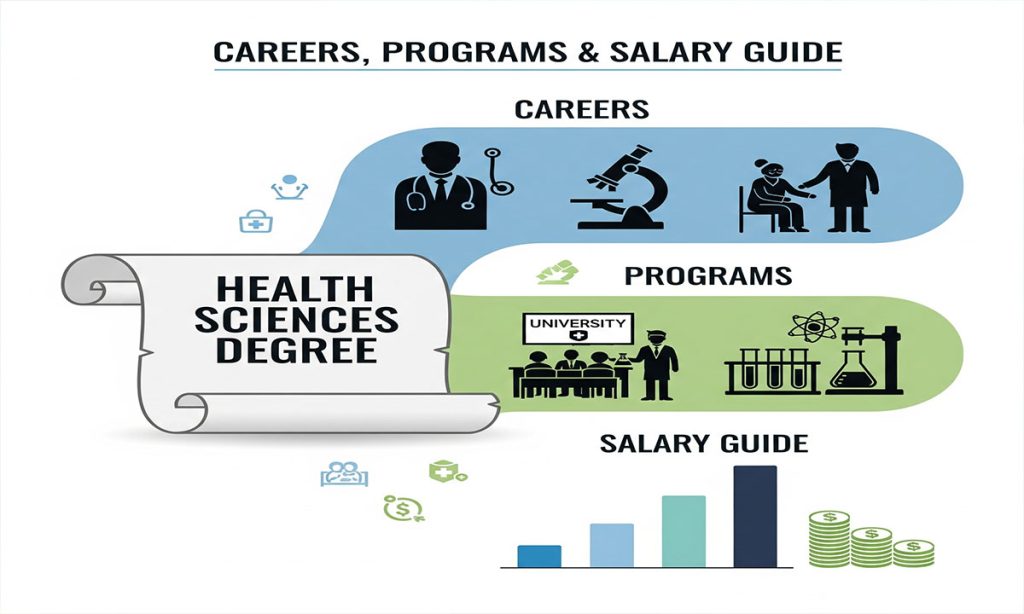A health sciences degree provides a broad foundation in healthcare, equipping graduates for diverse roles in medicine, research, public health and administration. This interdisciplinary education covers subjects from anatomy and biology to ethics and data analysis. Pursuing a health sciences degree means preparing to make a meaningful impact in people’s lives while enjoying strong job stability and growth. In this guide, we’ll explain what health sciences programs involve, highlight top health sciences careers, discuss salary trends, and explore specializations like public health science and biomedical science. Whether you’re considering a bachelor in health sciences or an advanced public health degree, this article will help you navigate your options and career prospects.
Figure: Professor instructing a student in a health sciences laboratory. Health sciences education is inherently experiential. Students often learn through labs, clinical simulations and hands-on projects, guided by experienced faculty. For example, students in a Bachelor of Health Sciences program may train in biology labs, practice medical procedures in simulation centers, and study healthcare policy. This combination of science and applied learning prepares graduates for roles such as medical laboratory technologist, health educator, or clinical manager. Dr. Meredith O’Hara of Southern New Hampshire University notes that “there are an abundance of both clinical and non-clinical opportunities in the health sciences”. In short, a health sciences degree blends health sciences education (biology, anatomy, epidemiology, etc.) with practical skills (communication, ethics, administration) to prepare students for healthcare careers.
Table of Contents
Health Sciences Degrees and Programs
Health sciences degrees are offered at multiple levels, each serving different career goals:
- Associate in Health Sciences: A 2-year program covering foundational coursework (e.g., human anatomy, medical terminology, basic patient care). Graduates often qualify for entry-level allied health roles (pharmacy technician, dental hygienist assistant, clinical research coordinator) or can continue into a bachelor’s program.
- Bachelor in Health Sciences (BS/BA): A 4-year degree that provides a broad foundation in clinical principles, healthcare systems, and research. For example, Northeastern University notes that a bachelor’s in health sciences “offers a broad foundation in clinical principles, health systems, research, and policy”. Typical coursework may include biology, chemistry, public health, biostatistics, and healthcare management. A bachelor in health sciences can lead to jobs in health services management, clinical research, health education, or act as a stepping stone to professional degrees (such as medicine, dentistry or graduate health fields).
- Master’s Degrees (MS, MPH, MHA, etc.): Graduate programs offer specialized training. Examples include a Master of Public Health (MPH) for careers in epidemiology or health policy, a Master of Health Administration (MHA) for healthcare leadership, or an MS in Health Informatics. These programs deepen your expertise and often lead to higher-level roles. Northeastern notes that MPH graduates are in high demand nationwide; similarly, health informatics (big data in healthcare) is a growing field where a master’s is essential. In 2023, medical and health services managers (often requiring a master’s or bachelor’s) earned a median salary of $110,680, and their jobs are projected to grow by 29% between 2023 and 2033.
- Doctoral and Professional Degrees: Certain careers require advanced degrees. For example, to become a Physical Therapist, you must earn a Doctor of Physical Therapy (DPT) – the standard requirement in the U.S.. Doctor of Pharmacy (PharmD), Doctor of Medicine (MD), Doctor of Occupational Therapy, and PhDs in biomedical research are other examples. These programs build on a strong health sciences education and provide the credentials needed for clinical practice, research leadership, or faculty positions.
Many universities also offer online health science degrees and certificate programs. For instance, George Washington University offers a 100% online Bachelor of Science in Clinical Health Sciences, designed as a degree-completion program for working professionals. Such online health science degree programs allow military personnel or busy students to complete their degree remotely. Overall, whether you choose an on-campus or online program, the health sciences programs available today are flexible and diverse, ranging from quick certificate courses (e.g., phlebotomy certification, EMT training) to full graduate degrees.
Health Sciences Careers and Job Roles
Graduates with health sciences degrees can pursue a wide spectrum of health sciences jobs. According to the U.S. Bureau of Labor Statistics, healthcare occupations (broadly defined) are projected to grow much faster than average from 2023 to 2033, with roughly 1.9 million job openings each year due to growth and replacements. This indicates strong demand for qualified professionals with health science training.
Common entry-level careers for health science graduates include:
- Medical Assistant – supporting clinical staff with patient exams, record-keeping and basic procedures.
- Phlebotomist – drawing blood from patients for testing in clinics or labs.
- Clinical Laboratory Technician – performing lab tests to help diagnose diseases.
A bachelor’s degree can open up even more options. Graduates often find roles in allied health fields, management, and community health. For example, jobs such as health services manager, health educator, clinical research coordinator, and health program specialist are common. In fact, University of Bridgeport notes that with a BS in Health Sciences you can enter a “variety of settings, including healthcare centers, hospitals, health departments, and private companies”. These roles leverage skills in science, communication, and strategic planning developed through health sciences education.
Below are some high-paying career examples for health science degree holders (data from BLS projections and industry surveys):
- Health Services Manager – Oversees operations of clinics, hospitals or health departments. Median salary ≈$104,280 (2022 data), with a 28% projected growth rate from 2022–2032. These leaders ensure efficient delivery of care and compliance with healthcare laws.
- Radiation Therapist – Administers radiation treatment to cancer patients. Median salary ≈$85,560 (2022 data); growth ~6%. Requires technical training and attention to patient care.
- Dental Hygienist – Provides preventative dental care (cleaning, educating). Median salary ≈$94,260 (2024 data); growth ~11%. Requires an associate or bachelor’s in dental hygiene.
- Clinical Laboratory Technologist – Conducts lab tests for diagnosis. Median salary ≈$60,780 (2022); projected 7% growth (2022 data). Bachelor’s degree often required. BLS reports a 2024 median of $61,890.
- Occupational Health & Safety Specialist – Ensures workplace safety and health regulations. Median salary ≈$78,900. Growth ~6%. Often a bachelor’s degree in health or safety fields.
- Health Educator / Community Health Worker – Develops public health programs and teaches wellness. Median salary ≈$62,860 (2023 data); growth ~7%. Works in schools, non-profits, or government agencies.
- Biomedical Equipment Technician – Maintains medical devices. Median salary ≈$49,280 (2022); growth ~5%. Involves technical skills and knowledge of healthcare tech.
health sciences degree career paths include roles in health administration, biotechnology, medical sales, health informatics, and education. Graduates might also enter research positions (e.g., laboratory research assistant) or pursue further training for clinical careers (nurse practitioner, physician assistant, etc.). As SNHU notes, a health sciences degree is a launching point to “healthcare, health education and medical science” fields health sciences degree
Industry Sectors: Health science alumni find jobs across many sectors. According to Northeastern’s analysis of job postings, the top industries hiring health science graduates are:
Healthcare practitioners/technical, healthcare support, office/administrative, community/social services, management, and personal care services. In practice, this means graduates work in hospitals, clinics, labs, public health departments, nonprofits, and corporate healthcare settings health sciences degree
Figure: Health sciences students in a university lecture hall. The career options in health sciences are broad. Roles can be clinical (patient-facing, such as nursing or therapy) or administrative/research (behind-the-scenes, such as health policy, research coordination, or health IT). Dr. O’Hara of SNHU emphasizes that degrees in health science can lead to both types of careers. For example, with a bachelor’s in health sciences one might become a public health analyst or manage a medical lab, while an advanced degree could lead to roles like epidemiologist or health system executive. Many graduates also pursue related fields: those with a bachelor’s could enter nursing or physical therapy schools, and those who start in technical roles (e.g. lab assistant) can move into management with additional education health sciences degree
- Featured Career Example: According to BLS, Medical and Health Services Managers (often requiring a bachelor’s) are projected to grow 29% from 2023–2033, far faster than average. These professionals (earning $110,680 median in 2023) plan and direct healthcare facilities or departments. Clinical Laboratory Technologists (median $61,890 in 2024) and Health Educators (median $62,860 in 2023) are also solid health science jobs. These examples illustrate the health sciences salary potential for specialized roles.
Specializations in Health Sciences
Health sciences is a wide field that includes specialized tracks. Two important areas are Public Health Science and Biomedical Science, and also the more patient-focused Clinical Health Sciences.
Public Health Science
Public health science focuses on preventing disease and promoting health at the population level. A public health science degree blends biology and social sciences. For example, the University of Maryland’s Public Health Science program emphasizes life sciences and courses like epidemiology, biostatistics, and environmental health. Graduates are prepared for careers in epidemiology, health policy, environmental health, or health education. As Rutgers notes, students of public health science work to “solve public health challenges through the lens of scientific inquiry” health sciences degree
Jobs for public health science grads include community health worker, epidemiologist, health policy analyst, or environmental health specialist. With public health expertise in demand, these roles are growing. Northeastern reports that “we need more public health professionals right now,” noting high nationwide demand. For instance, jobs in health education and community health are projected to grow ~7% (2023–2033). Salaries in public health vary by role; health educators earn about $60–63K median, while epidemiologists and health policy analysts often require advanced degrees and pay more. In summary, a Public Health Science track equips students to address health issues at the community or global level health sciences degree
Biomedical Science Careers
Biomedical science applies biological and chemical knowledge to medicine and research. It encompasses lab-based research and the development of medical technologies. A biomedical science program covers subjects like human physiology, pathology, pharmacology and lab methods. According to Northeastern University, biomedical science is “all-encompassing” and involves disciplines such as biochemistry, molecular biology, and pharmacology. The field offers diverse career paths beyond the lab – including regulatory affairs, medical writing, and pharmaceutical roles.
Popular biomedical science career options (generally for those with graduate training) include:
- Biomedical Laboratory Technician (MS level): Works in lab research settings. Avg. salary ~$81,760. Duties include drug discovery research and compound analysis health sciences degree
- Senior Clinical Research Associate (MS/PhD): Oversees clinical trials; avg. ~$88,372. Supports testing and equipment handling in research.
- Biomedical Scientist (PhD): Designs and implements experiments, publishes findings; avg. ~$110,919.
- Medical Writer – creates scientific materials; avg. ~$96,190.
- Senior Medicinal Chemist (PhD) – develops new drug compounds; avg. ~$151,779.
For PhD holders, careers include university professor, research director, pharmaceutical marketing manager, or principal investigator leading lab teams. The breadth of options reflects Janero’s comment that biomedical science isn’t limited to the lab – it also includes business and clinical roles. In short, a biomedical science career path is ideal if you are interested in scientific research, drug development, or translating science into clinical solutions health sciences degree
Clinical Health Sciences
Clinical health sciences refers to the patient-care side of health science. This includes roles like nursing, therapy, radiology, and other hands-on professions. Many health science programs have a clinical health sciences track or pathway – sometimes as an online completion program for allied health workers. These programs cover advanced clinical topics, anatomy, physiology, and prepare students for supervisory positions in clinical settings health sciences degree
Graduates often work as clinicians (nurses, therapists) or clinical supervisors. For example, to become a Physical Therapist, one must complete a Doctor of Physical Therapy (DPT) program. As Bouvé notes, some health science careers require advanced clinical degrees. However, shorter programs exist too: certificates and associate degrees in nursing, radiologic tech, or medical lab science can provide a quick entry into patient care. Many health science students start in a clinical technician role and use their bachelor’s to move into management health sciences degree
Clinical health science fields are expected to grow as well. While not all health science jobs require patient care, roles like Occupational Therapist (median $98,340) and Pharmacist (median $134,570, doctoral degree) are highly specialized. Other jobs like Emergency Medical Technicians (EMTs) or Licensed Practical Nurses (LPNs) require shorter training and provide necessary support in healthcare settings. In all, clinical health science is a major branch of the field, encompassing any career that involves direct patient health and rehabilitation health sciences degree
Health Sciences Salary and Job Outlook
Job Growth: Careers for health science graduates are generally strong. BLS projects 13% growth in healthcare occupations from 2021–2031, driven by aging populations and chronic disease care. This is “much faster than average,” with about 1.9 million openings per year on average. For example, healthcare practitioners and technical occupations saw a median pay of $83,090 in 2024, and are expanding rapidly as demand rises. In short, health science degrees are in demand: the labor market needs trained professionals to fill roles from hospital clinics to community health programs health sciences degree
Salary Ranges: Earnings in health science fields depend on role and education. On average, health science careers pay well above the national median. BLS data for 2024 show median wages of $83,090 for healthcare practitioners/technical roles (versus $49,500 overall). Here are some figures:
- Healthcare Practitioners/Tech (2024 median) – $83,090.
- Health Services Managers (2023 median) – $110,680.
- Clinical Lab Tech (2024 median) – $61,890.
- Dental Hygienist (2024 median) – $94,260.
- Health Educator/Community Health (2023 median) – $62,860.
- Occupational Health & Safety Specialist (2024 median) – $78,900.
Many health science graduates report starting salaries in the $50–70K range, with potential to rise into six figures after advanced training or managerial roles. For instance, Northeastern finds that healthcare data scientists earn a median of $98K with a bachelor’s, jumping to $113,900 with a master’s health sciences degree
Key Takeaways:
- Health science careers generally exceed the median wage due to specialized skills. Even entry-level jobs like medical assistants or technicians often pay $40–$60K, with growth opportunities.
- Advanced degrees boost earnings. For example, BLS notes Medical and Health Services Managers (requiring at least a bachelor’s) earned $110K median, reflecting the value of managerial health science education.
- The healthcare industry’s growth means pay and job security are strong. Roles in management, education, and research tend to be particularly lucrative and in demand health sciences degree
In summary, health sciences salary outlook is positive across the board. With a mix of competitive pay and high growth rates, professionals with a health sciences degree are well-compensated relative to many fields.
Frequently Asked Questions
Q: What can I do with a health sciences degree?
A: A health sciences degree offers versatile career options. Graduates work in clinical support (like lab technologist or therapy assistant), administration (health services manager), research (clinical trial coordinator), and education (health educator). The degree also serves as a foundation for advanced healthcare studies (e.g. nursing, physician assistant, public health, or medical school). As SNHU explains, “Health science encompasses a wide array of professions centered around helping others get well and stay well” health sciences degree
Q: Are health science degrees in demand?
A: Yes. Demand is very strong. The BLS projects healthcare occupations will see about 1.9 million openings per year through 2033, much faster growth than average. Fields like health administration, clinical research, allied health and public health are growing rapidly. For example, medical and health services managers are expected to grow 29% by 2033. This means graduates of health sciences programs have excellent job prospects.
Q: How much can I earn with a health science degree?
A: Salaries vary by role and education. Entry-level technical positions (e.g. lab tech) often start $40K–$60K. With a bachelor’s, roles like health educator or coordinator may earn $60K–$80K. Careers requiring a master’s or higher (like public health analyst, healthcare manager, or lab director) can pay $90K–$130K or more. In short, health science careers typically pay above the national median, and higher degrees generally lead to higher salaries.
Q: What courses are included in a health sciences program?
A: Health sciences programs combine science and healthcare subjects. Typical courses include anatomy & physiology, biology, chemistry, nutrition, healthcare ethics, health policy, and research methods. Programs also cover public health topics (like epidemiology) and practical skills (like patient communication). Some curricula emphasize lab work and internships to give hands-on experience. The exact courses vary by specialization, but all aim to build a strong science foundation for healthcare.
Q: Can I earn a health sciences degree online?
A: Yes. Many accredited colleges offer online health sciences degrees. These programs are designed to be flexible for working students. For example, the George Washington University offers a 100% online BS in Clinical Health Sciences. Online programs typically include virtual labs, live lectures, and local clinical placements. As long as the school is accredited, an online health sciences degree has the same academic value as an on-campus one.
Q: Is a health sciences degree worth it?
A: For those interested in healthcare, a health sciences degree can be very worthwhile. It opens many career paths and supports further education. The field’s high job growth and competitive salaries mean graduates are likely to find employment. Additionally, the degree is versatile – it prepares you for roles in hospitals, research labs, government, and more. If you have a passion for science and helping people, a health sciences program can be a strong investment in your future.
Conclusion
In summary, a health sciences degree equips you with interdisciplinary knowledge and practical skills for a dynamic healthcare career. Programs at all levels – from associate certificates to doctoral degrees – allow you to tailor your education to your goals. With health science jobs projected to grow much faster than average and salaries often above the national median, graduates enjoy strong career prospects and competitive pay. Whether you aim for direct patient care, biomedical research, health administration, or public health, a health sciences education provides the foundation you need.
Ready to start your journey? Explore accredited health sciences programs (including online options), network with professionals, and gain experience through internships. Share this article with anyone interested in a healthcare career, and feel free to comment below with your questions about health science education and jobs. Your path to a rewarding health sciences career begins with the first step – a quality degree and a commitment to learning.





